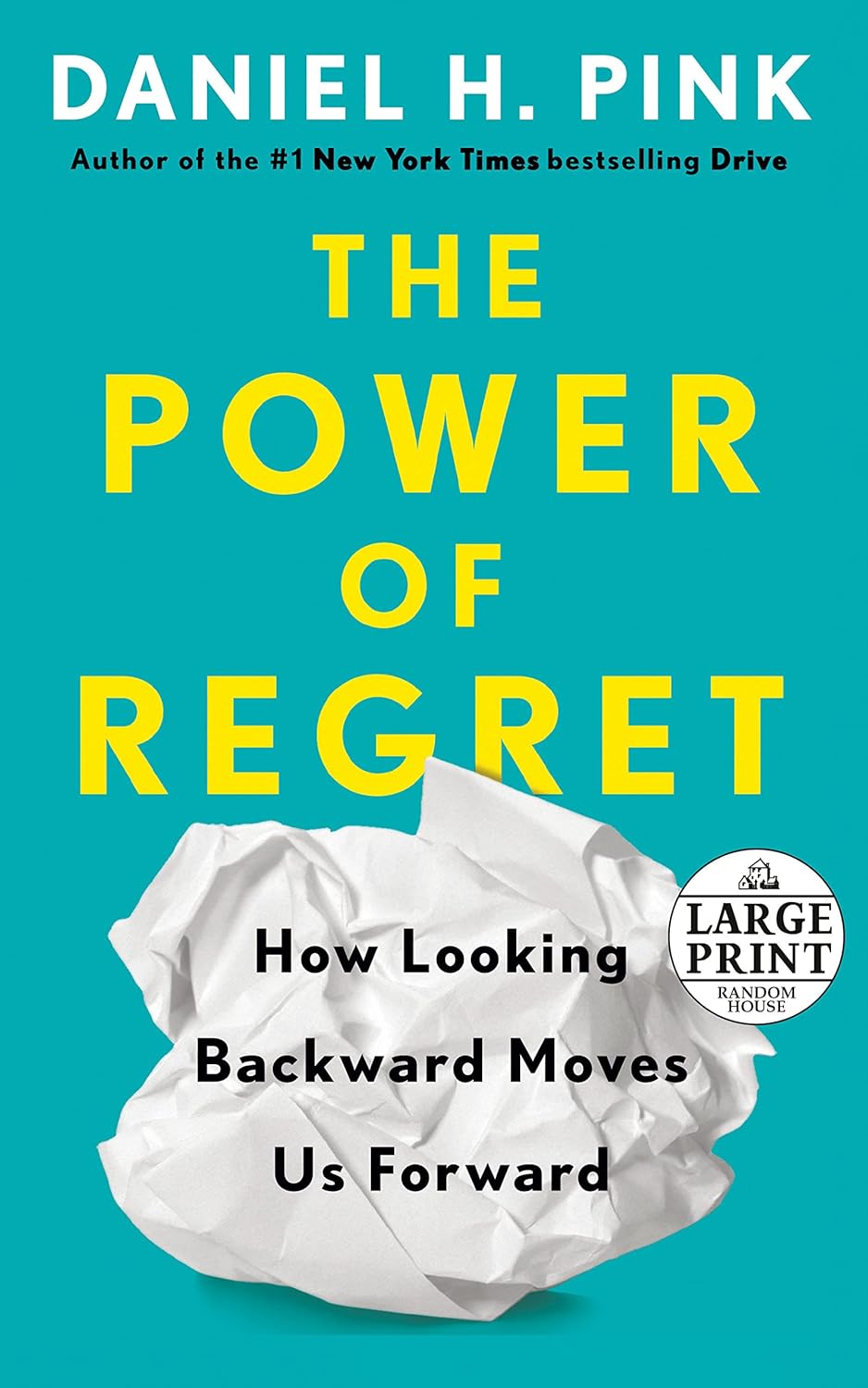Looking Backward to Move Forward
Based on ideas in The Power of Regret by Dan Pink

I almost didn’t crack open this book because I bought into the popular notion that regret is foolish. Why would I want to spend time reading 211 pages on a topic I presumed to be worthless? But I’m glad I did open it (and actually read it). Daniel Pink conducted the largest-ever survey of regrets and found many lessons for work and life. What did he find?
-
- Regret is universal (yes, even for Bob Dylan, Angelina Jolie, and others who proclaim: “I don’t believe in regrets.”)
- Regret is valuable (we gain insights that sharpen decision-making, improve performance, and strengthen connections)
WHAT DO PEOPLE REGRET: The Four Core Regrets
Daniel Pink’s research shows that people’s regrets – regardless of the specific topic – fall into four primary categories:
Foundation Regrets: When we fail to be responsible, conscientious, or prudent, we end up with foundation regrets. For example, these regrets may result from our choices about education, finance, or health. We squander our money or make poor health choices and this has deep ramifications later on in life. These regrets are due to a failure of foresight and conscientiousness. Perhaps we spend too much or save too little. When you see these phrases – too much, too little – you’re likely to be talking about a foundation regret. Foundation regrets sound like this: If only I’d done the work. While some regrets have an immediate consequence – drive too fast and you get into a crash – foundation regrets arrive slowly after a period of not exercising or saving sufficiently over time.
What’s the lesson? Think ahead; do the work; start now.
Boldness Regrets: These are the regrets we experience when we regret the path not taken. Research shows that we regret the opportunities we didn’t take (to start a business, pursue a love interest, etc.) more than those we did. Boldness regrets sound like this: If only I’d taken that risk. Instead, we often choose to play it safe. These types of what if regrets (a regret of inaction) outnumber regrets of action by two to one. When you do something you regret, you know the outcome. But when you don’t do something, you’re left speculating – hmmm, I wonder what could have become of all of those thwarted possibilities for growth and opportunity…
What’s the lesson? Be bold; speak your mind; ask for that date; book that trip; take that unconventional job.
Moral Regrets: Because people essentially want to be good, we regret making immoral decisions (although we all define “morality” differently) – whether that involves cheating on a spouse or a business partner or a test. Moral regrets are often about harm, cheating, disloyalty, subversion, and desecration. Moral regrets sound like this: If only I’d done the right thing. Marital infidelity tops the list of moral regrets according to the World Regret Survey.
What’s the lesson? When in doubt, do what’s right.
Connection Regrets: We experience regret when our relationships fall apart or we never achieve that deep connection we were hoping for. Connections with others give our life purpose and our role in breaking or neglecting relationships is a big source of human regret. Regrets about connection come from our fundamental human need to belong. Connection regrets sound like this: If only I’d reached out. These regrets can come from rifts (after a specific incident) or drifts (occurring more subtly over time with no clear beginning, middle, or end). While rifts are dramatic, drifts – slowly losing touch – are more common. What’s the lesson? Don’t be embarrassed and just make that call; reach out; repair that rift.
HOW TO LEARN FROM YOUR REGRETS TO IMPROVE YOUR FUTURE
Science shows that rather than trying to escape the negative emotions that come from regret, we can use these emotions to change our behaviors and follow a different path. In fact, people who do just this, end up leading happier and more satisfying lives.
Here is a 3-step process you can use to help you turn feelings of regret into actions that can transform your life.
STEP 1: Disclose. Rather than keeping our regrets to ourselves (and feeling shameful about them), research shows that sharing our regrets – in writing or by talking with others – provides both physiological and psychological relief. Consider writing about or sharing your regrets with others for just 15 minutes a day for 3 days and feel the power of relive and relieve.
STEP 2: Reframe. Maybe you can’t undo the regret, but you can choose how to respond to it. Show some self-compassion by treating yourself the way you would respond to a dear friend who came to you with the same regret. You are more likely to change your future behavior if you treat yourself with kindness and compassion. Normalize the regret by reminding yourself that mistakes are human.
STEP 3: Extract a lesson. Analyze the lessons learned by taking a different perspective – zoom out and imagine the perspective of a neutral observer or how you might look back on this regret in the future. From this vantage point and a bit of distance, what advice would you give yourself? What next steps could you take to respond to the regret in a way that will propel you forward?
SO, WHAT DOES ANY OF THIS HAVE TO DO WITH EDUCATION?!?! The Main Idea’s PD Suggestions: A quick workshop to use regret to propel us forward
Educators have spent several years educating kids while also coping with their own struggles during a pandemic. Many of these struggles continue. All of us have some ways we are proud of what we’ve done during this challenging time – both personally and professionally –and of course, we have some regrets as well. After all, Dan Pink has shown that regrets are perfectly human.
We can’t control a worldwide virus and its aftermath, but we can control whether we make good use of lessons learned from it. Consider running a staff workshop to show staff how to turn regret into a positive tool to improve their lives.
1. Share the four core regrets with staff. Begin by sharing that having regrets is a completely natural part of being human, and that we’re going to spend a little time thinking about and discussing any regrets that may have surfaced during the challenges dealing with a pandemic and its aftermath. Distribute copies of the above 1-pager and give everyone time to read it on their own silently.
2. Give staff time to reflect on any regrets from the past two years. Give out paper or let staff open their devices to spend a few minutes thinking about and writing down any regrets – personal or professional – that come to mind as they think about the past few years. Let them know it will be optional to share so they can be honest with themselves.
Share a few examples aloud before they start:
-
- The pandemic made me realize that I regret having spent the decade before the pandemic grading papers late at school and never making it home in time to eat dinner with my family.
- I regret that no matter how hard I tried, I just couldn’t get two students to connect to my virtual classes during the pandemic and now they’ve dropped out of school.
3. In small groups, let staff share and categorize their regrets. In small groups of 2-4 people, have staff share their regrets if they would like to. It is fine if only some members of the group share. Remind them that author Daniel Pink says that research shows that it is cathartic when people write about or share their regrets with others – it helps to provide some relief and healing. Next, ask them to look at the four core regrets to see if they can categorize the type of regrets they are experiencing
4. Build a wall of hopes and dreams. The point of this exercise is to look back so your staff can move forward. As a large group have everyone contribute to a physical or virtual mural of their hopes and dreams for the upcoming school year to address the needs revealed from their regrets. Consider putting up this mural in the staff room as a reminder or reflecting back on it at a future staff meeting.
For example, from the two regrets above, they might include the following on the mural:
-
- I hope to finish my lesson planning at school so I can make it home to eat with my family regularly in the upcoming school year.
- I hope to finish my lesson planning at school so I can make it home to eat with my family regularly during the school year.

